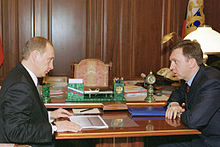Russian oligarchs
Well-connected oligarchs like Roman Abramovich, Michail Khodorkovsky, Boris Berezovsky and Vladimir Potanin acquired key assets at a fraction of the value at the loans for shares scheme auctions conducted in the run-up to the election.
[3] Defenders of the out-of-favor oligarchs argue that the companies they acquired were not highly valued at the time because they still ran on Soviet principles, with non-existent stock control, huge payrolls, no financial reporting and scant regard for profit.
During Mikhail Gorbachev's perestroika (c. 1985–1991), many businessmen in Russia imported goods such as personal computers and jeans into the country and sold them for a hefty profit.
[7][8][9][10] Economists Sergei Guriev and Andrei Rachinsky contrast older oligarchs with nomenklatura ties and younger-generation entrepreneurs such as Kakha Bendukidze who built their wealth from scratch because Gorbachev's reforms affected a period "when co-existence of regulated and quasi-market prices created huge opportunities for arbitrage.
[14] Mikhail Khodorkovsky started his business importing computers under auspices of the Komsomol-authorised Center for Scientific and Technical Creativity of the Youth in 1986, briefly serving as a deputy secretary of the Komsomol for a district in Moscow in 1987.
[15] Vladimir Vinogradov was the chief economist of Promstroybank, one of the six banks existing in the Soviet Union,[16] previously serving as the secretary of Atommash plant Komsomol organisation.
[4] They formed what became known as the Semibankirschina (or "seven-banker outfit", compare Seven Boyars), a group of businessmen with a great influence on Boris Yeltsin and his political environment.
[25][26] Vladimir Gusinsky of MediaMost and Boris Berezovsky both avoided legal proceedings by leaving Russia, and the most prominent, Mikhail Khodorkovsky of Yukos oil, was arrested in October 2003 and sentenced to 9 years.
[27] A second wave of oligarchs emerged in the 2000s, friends and former colleagues of President Putin either from his years in the St Petersburg municipal administration or his Dresden tenure in the KGB.
[36] The ten most-prominent oligarchs of the early Putin era included Roman Abramovich, Oleg Deripaska, Mikhail Prokhorov, Alisher Usmanov, Viktor Vekselberg, Leonid Mikhelson, Arkady Rotenberg, Gennady Timchenko, Andrey Guryev and Vitaly Malkin.
[44][45][46] The fall in the oligarchs' wealth relates closely to the meltdown in Russia's stock market, as by 2008 the RTS Index had lost 71% of its value due to the capital flight after the Russo-Georgian War of August 2008.
[48][49] After the 2022 Russian invasion of Ukraine, Canada, US, and European leaders with the addition of Japan, took unprecedented steps to sanction Putin and the oligarchs directly.
[54] Several dozen business people with family connections to top politicians include President Putin’s younger daughter Katerina Tikhonova, who through her investment fund has been the recipient of numerous large contracts from state-owned energy companies.
Andrey Ryumin,[57] the son-in-law of Viktor Medvedchuk, President Putin’s former closest ally in Ukraine, runs another investment fund with large agricultural holdings which have become recipients of state subsidies for import substitution (Rouhandeh 2022).
[58][circular reference] The list of oligarchs and business executives who have risen to prominence and who have been sanctioned after Russia's invasion of Ukraine includes: The British Government policy encouraged the flow of foreign capital into the United Kingdom, for example through the foreign investor visa routes, introduced during John Major's premiership in 1994, one-fifth of whose recipients since 2008 are Russian citizens.
[99] A significant number of Russian oligarchs have bought homes in upmarket sections of London[100] in the United Kingdom, which has been dubbed "Moscow on Thames" or "Londongrad".
[101] Some, such as Eugene Shvidler, Alexander Knaster, Konstantin Kagalovsky, David Wilkowske and Abram Reznikov, are expatriates, having taken permanent residency in London.



